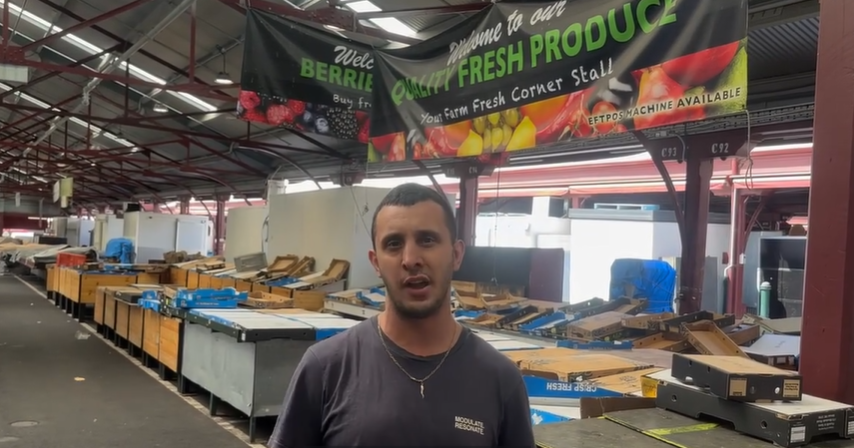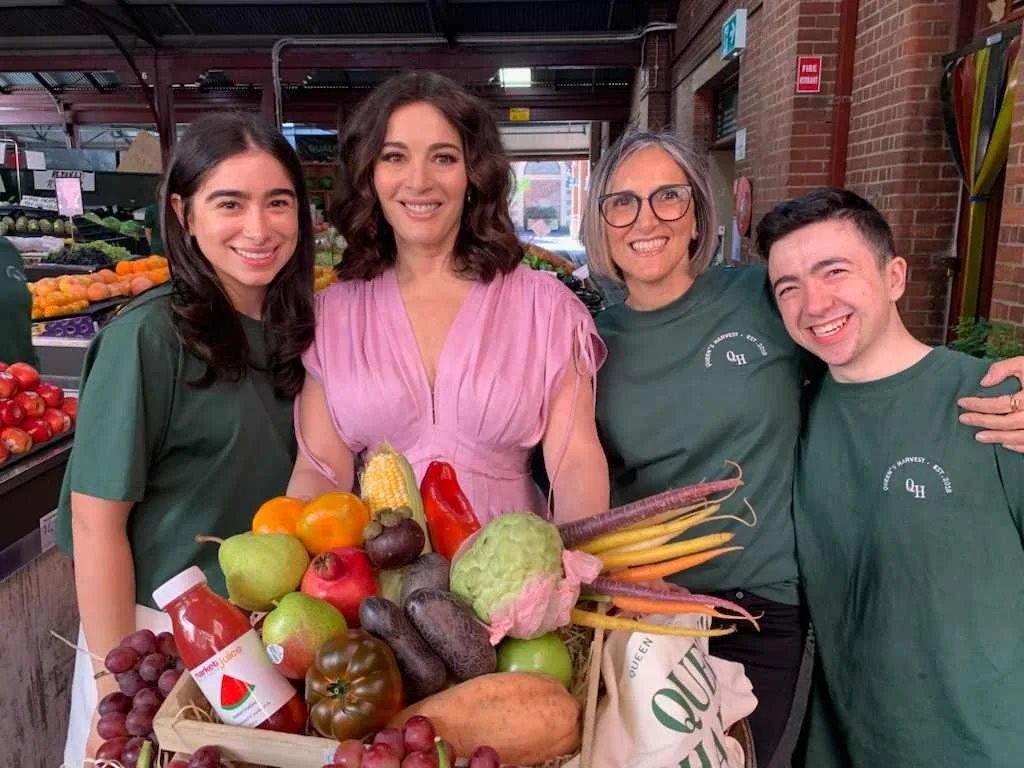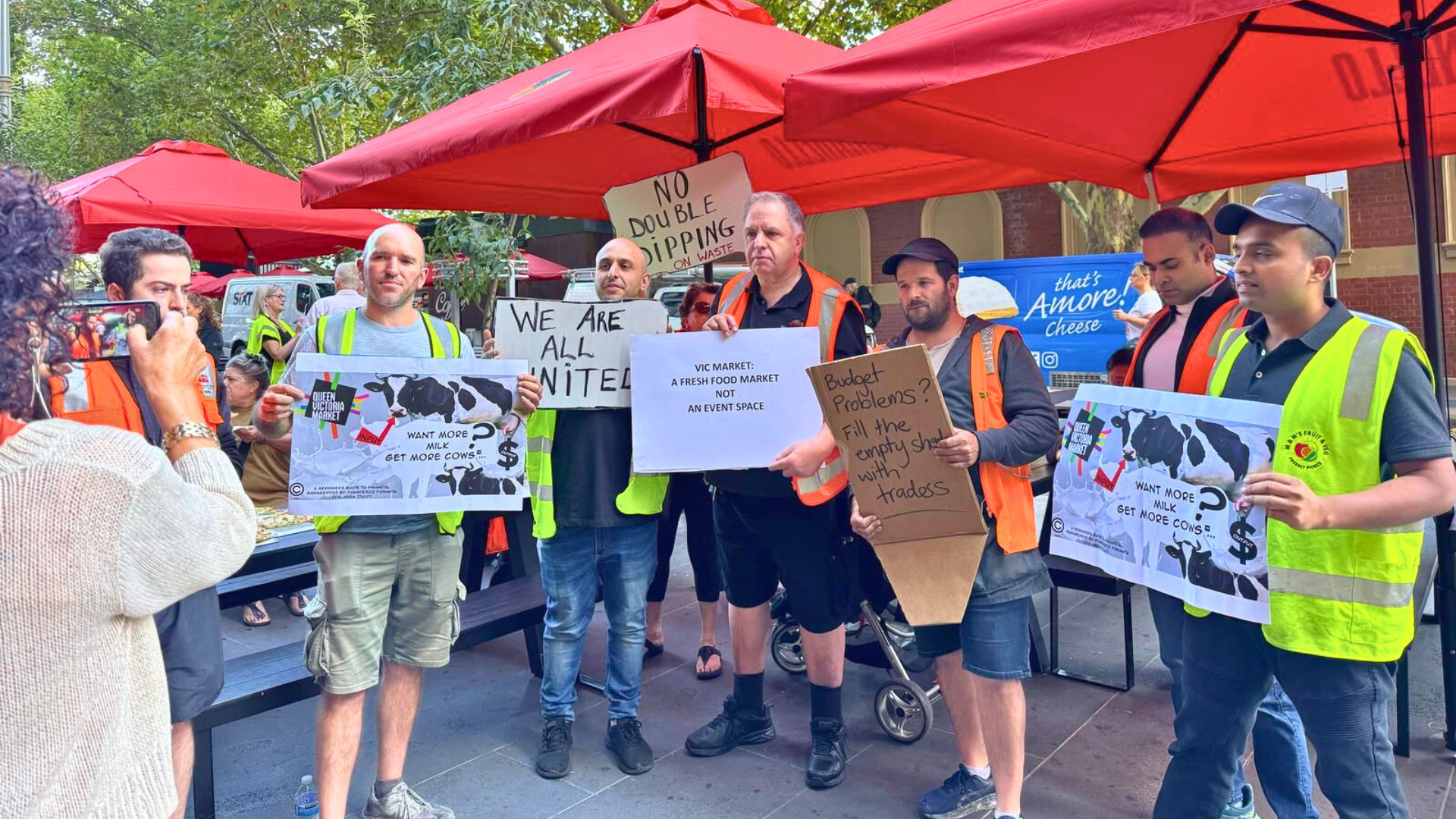Melbourne’s beloved Queen Victoria Market (QVM) is in turmoil. For the first time in its 147-year history, the vibrant heart of the market sits silent as fruit and vegetable traders stage a strike.
Traders marched through deserted aisles on Tuesday morning, accusing QVM management of alleged “double-dipping” and threatening their existence. Signs they held starkly indicted what they call “financial mismanagement” by the City of Melbourne and QVM leadership.
This isn’t just about a few extra dollars, traders say. It’s a fight for survival. They allege that new charges for electricity and waste disposal, costs they claim were always included in their fees, are a blatant cash grab.

Alleged ‘double-dipping’ and ‘bullying tactics’:
Rocco Tripodi, a second-generation stallholder, runs his business with his Cypriot wife, Jenny Theophanous-Tripodi, working in the back end. He doesn’t mince words.
“We have video proof of the QVM CEO (Matt Elliott) admitting these charges were always covered,” he claimed.
“Now they’re trying to charge us something we are already paying for to create a new revenue stream for themselves. It’s a disgrace!”
Tripodi warned that these charges, potentially reaching $40,000 annually for larger stalls like his, will force them to raise prices, hitting consumers already reeling from the cost-of-living crisis.
“They’re picking our pockets while we’re trying to put food on our own tables,” he fumed, remembering his childhood in the market when it was filled with Greeks and Italians.
The anger extends beyond just the new fees. Peter Kaparis, a veteran trader, painted a picture of a market in decline, where fruit and vegetable stalls are vanishing, replaced by “food trucks and book stalls.”
“I am lucky I have a few loyal clients; otherwise, I am the last one in A Shed,” he said, lamenting they heyday of QVM’s fruit and veggie market when he took over the family business 38 years ago.
He pointed a finger at the ballooning QVM administration, now housed on the second floor of the plush Lexus building, while traders struggle.
“They’ve got around 65 staff in their ivory tower, up from just 18 around 10 years ago, but they can’t listen to the people who make this market what it is,” he said.
Kaparis also described alleged “bullying tactics,” citing excessive regulations and petty infringement notices.
“Forget to reel in your awning after a 14-hour day? After the first infringement, they’ll slap you with a fine and lock it up, creating a safety hazard. They treat us like children,” he raged.

A market turned ‘tourist trap’:
Even fish traders, not directly involved in the strike, expressed concerns.
Sav Giannoukas lamented the market’s transformation into a “tourist attraction,” more focused on photo ops than supporting its vendors. He agrees rules have been getting out of hand, especially in the last five years.
“They’re driving away the heart and soul of this place,” he said. “Road closures, constant construction, and now these additional costs.”
As a fish trader, electricity is metered.
“This isn’t the case with the fruit and vegetable traders, and there is confusion. Also, they are introducing new costs without bringing in more customers,” he said. “This should not be happening when construction is already harming our businesses.”
Council defends market management
Melbourne’s Lord Mayor Nick Reece offered The Greek Herald a standard media response, acknowledging the traders’ concerns but defending market management’s approach.
“Queen Victoria Market traders are the heart of this iconic Melbourne institution – and I am confident management understands this and will make fair decisions to ensure the market continues to thrive,” he said.
“We’re doing everything we can to minimise the impact on traders during the precinct renewal. Since 2017, we’ve provided around $3 million in grants and adapted our works to further reduce disruption to their businesses.
“We will continue to help traders apply for funding and rent relief, as well as with marketing support and business mentoring.”

According to the City of Melbourne, trader license fees have only seen minimal increases since 2015, remaining below inflation and the rising cost of delivering services. They argue that in most retail settings, businesses pay separately for utilities and waste disposal, and QVM has absorbed these costs for years. They also claim that traders were given 18 months’ notice of these changes and were included in discussions about their implementation.
Traders say there were mandates handed down rather than real consultation.
The gloves are off.
The traders’ message is clear: they’ve had enough.
“We’re not backing down,” Tripodi declared. “We’re being civil at the moment, but we may block Queen Street with our forklifts. We’re fighting for our livelihoods.”
*The Greek Herald reached out to QVM CEO Matt Elliott on Tuesday, who has not responded to our request.
